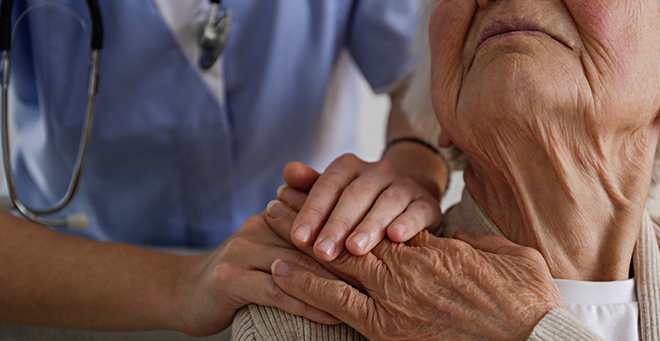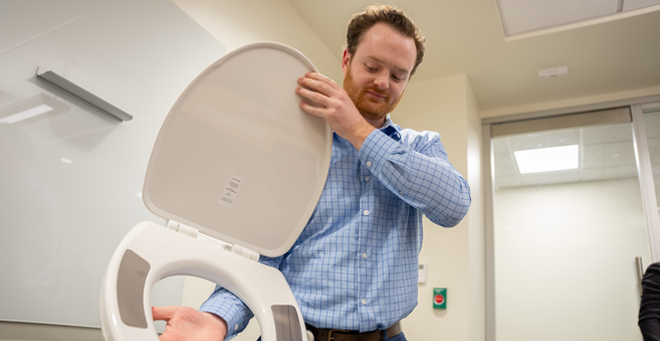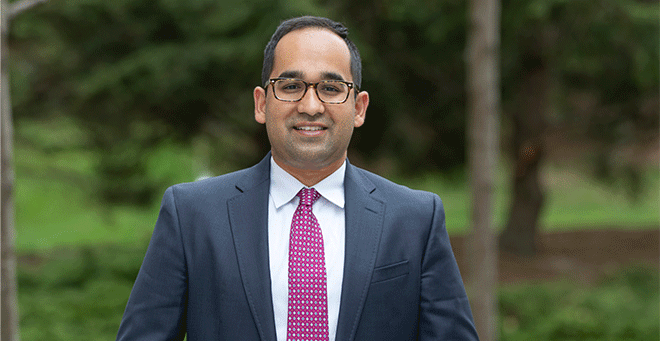
UMass Chan Medical School researchers will begin enrolling patients this summer across its UMass Memorial Health and Baystate Health clinical campuses to study post-acute skilled nursing facility services provided in the patient’s home.
The Skilled Nursing Facility or SNF at Home trial is a large, randomized clinical trial, the first of its kind, supported by a $6.5 million grant from the Massachusetts Executive Office of Health and Human Services. Researchers plan to enroll 650 patients who are eligible for inpatient-level skilled nursing care following acute hospitalization across the two sites.
According to principal investigator Apurv Soni, MD, PhD’21, assistant professor of medicine and co-director of the Program in Digital Medicine, one in five hospital patients with Medicare are admitted to some level of rehabilitation facility after their inpatient stay. These post-acute facilities provide skilled nursing care, physical therapy and occupational therapy, and help patients regain functional activity for daily living, such as bathing, eating and being able to dress themselves.
“We already have a crisis there, because there aren’t enough skilled nursing facilities,” said Dr. Soni. “From a health system perspective, being able to have an enhanced program that you can discharge patients to is very important.”
Skilled nursing facilities commonly provide rehabilitative care for older adults recovering from hospitalization and at a level higher than what can typically be delivered with home health. And the outcomes for patients admitted to skilled nursing facilities aren’t as successful as they should be, according to Soni.
“One in four of those patients who are going to a skilled nursing facility end up back in the hospital within 30 days,” he said.
The primary outcome for the SNF at Home trial will be measuring the 30-day rehospitalization rate, said Soni. Researchers will also assess patients’ functional status and satisfaction and compare costs of providing skilled nursing facility care in a patient’s home with those of inpatient skilled nursing facility care. The impact of home-based versus inpatient care on patients’ families or other caregivers will also be measured.
Researchers will follow patients for six months.
Peter Lindenauer, MD, MSc, chair of Baystate’s Department of Healthcare Delivery and Population Sciences, and multi-principal investigator, said, “Randomized controlled trials are not only the gold standard for creating evidence about new drugs and devices but extend to innovative approaches to health care delivery and financing.”
The SNF at Home trial builds a new level of remote health care service research—this time delving into post-acute rehabilitation—onto programs like UMass Memorial Health’s Hospital at Home and Healthy at Home, which use app-based consumer technology and comprehensive virtual disease management to improve quality of life and achieve better health outcomes for patients with chronic obstructive pulmonary disease.
“As we learned from our Hospital at Home program, it is not only possible to take excellent care of patients with serious illness in the home, but patients also tend to prefer and do well with this model of care,” said Wendy Mitchell, MD, assistant professor of medicine, medical director of digital programs & strategy and clinical lead for the study at UMass Memorial Medical Center. “We are excited to also now be able to provide patients with sub-acute rehabilitation in their home through our new SNF at Home trial program. This program will allow patients to rehabilitate in the comfort of their own home and will create additional capacity to care for sick patients who need our hospitals.”
“One of the hardest transitions that seniors face is being moved out of their home and into a skilled nursing facility,” said Terence R. Flotte, MD, the Celia and Isaac Haidak Professor, executive deputy chancellor, provost and dean of the T.H. Chan School of Medicine. “They need skilled nursing, but leaving their home environment is both emotionally traumatic and cognitively disorienting. The SNF at Home program uses modern remote digital technology to provide skilled nursing without removing them from their home.”

